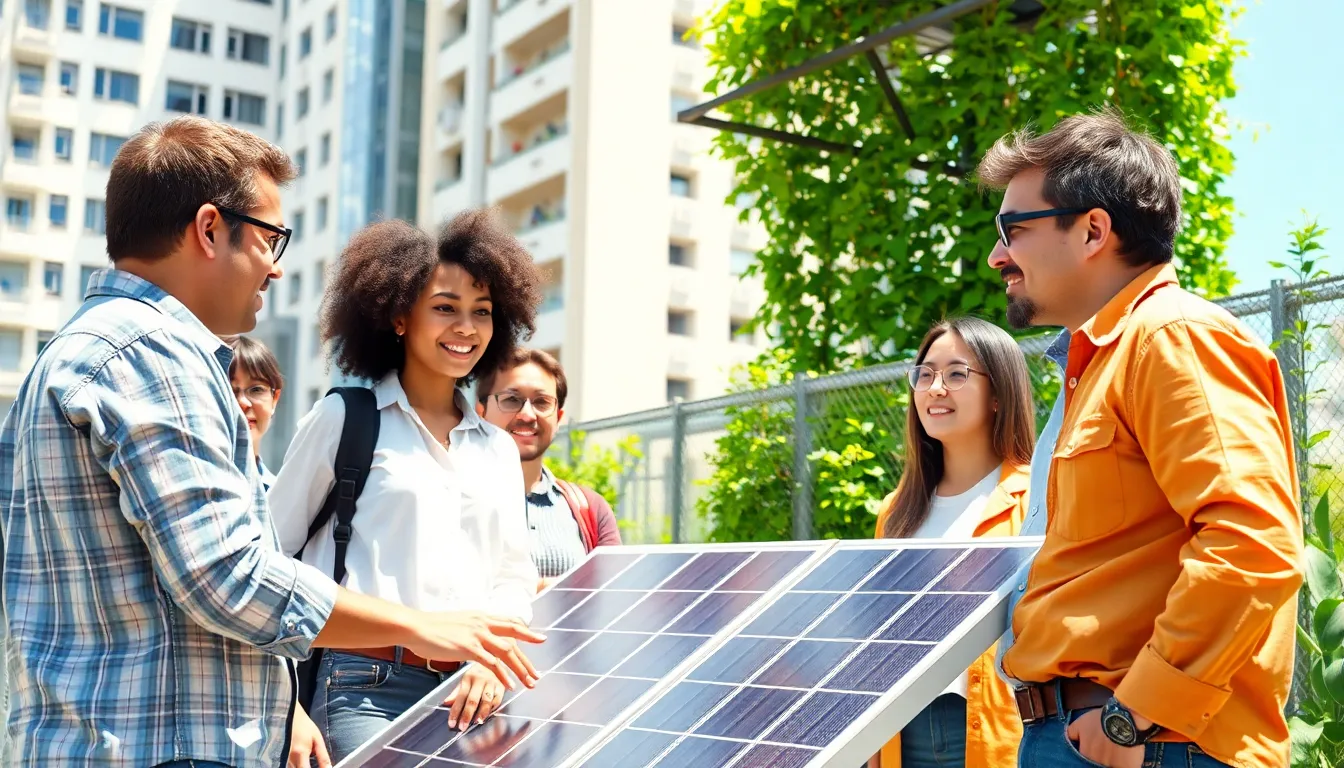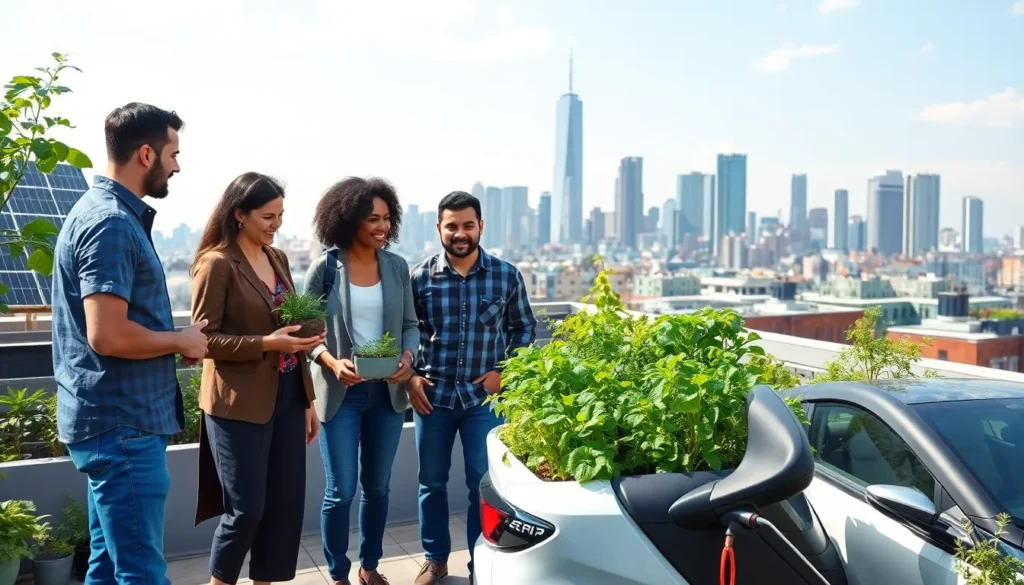Table of Contents
ToggleIn a world where climate change often feels like the villain in a superhero movie, new sustainable technology is stepping up to save the day. Imagine a future where your gadgets not only make life easier but also help save the planet. Sounds like a plot twist, right? Well, it’s happening now!
Overview of New Sustainable Technology
New sustainable technology focuses on innovative solutions that reduce environmental impact. Innovations in solar energy provide clean, renewable power to homes and businesses. Electrification of transportation significantly decreases greenhouse gas emissions compared to traditional fuels. Smart grid systems enhance energy efficiency, allowing better management of electricity distribution.
Biodegradable materials replace conventional plastics, minimizing waste in landfills and oceans. Companies invest in carbon capture technology, aiming to remove carbon dioxide from the atmosphere. Vertical farming utilizes limited space, producing food sustainably in urban settings. Renewable energy sources like wind and solar become more affordable as technology improves.
Advances in energy storage technologies, such as batteries, enable better utilization of renewable resources. These systems also contribute to grid stability, making energy supply more reliable. Water purification technologies offer sustainable solutions to provide clean drinking water, especially in developing regions.
Artificial intelligence optimizes resource management, enhancing productivity while minimizing waste. As organizations integrate these technologies, they transition toward a more sustainable future. Public awareness around sustainable practices increases, driving consumer demand for eco-friendly products. The collective impact of these innovations leads to a significant reduction in carbon footprints globally.
Investment in research and development accelerates the growth of this sector. Enhanced collaboration among governments, businesses, and communities strengthens the push toward sustainability.
Importance of Sustainable Technology

Sustainable technology plays a critical role in addressing environmental challenges. Its adoption directly influences both ecological health and economic viability.
Environmental Benefits
Sustainable technologies reduce carbon emissions, significantly mitigating climate change. Innovations in solar energy provide abundant clean power, reducing reliance on fossil fuels. Biodegradable materials decrease landfill waste, benefiting ecosystems. Vertical farming uses less land and water, yielding more food close to urban centers. Advancements in carbon capture technology limit greenhouse gases in the atmosphere. Smart grid systems enhance energy efficiency, leading to decreased power consumption. Water purification technologies ensure access to clean drinking water while preserving natural resources. Public awareness surrounding these innovations grows, prompting increased consumer demand for eco-friendly products.
Economic Advantages
Sustainable technology promotes economic growth by creating green jobs. The renewable energy sector employs millions, fostering innovation and development. Cost savings emerge from energy efficiency measures, reducing operational expenses for businesses. Investments in sustainable technology stimulate local economies, attracting funding and talent. Increased affordability of renewable energy sources leads to wider adoption across various markets. Companies prioritize sustainability to enhance their brand image, driving consumer loyalty. Additionally, reduced resource dependency lowers risks associated with price volatility. Overall, the shift towards sustainable practices positions economies for resilience and long-term stability.
Types of New Sustainable Technology
Sustainable technology encompasses various innovations aimed at addressing environmental concerns. Each category contributes uniquely to ecological preservation and economic development.
Renewable Energy Innovations
Solar power advancements continue to lead the renewable sector, offering efficient ways to harness sunlight. Wind energy technology sees turbines designed for higher efficiency, making wind power increasingly viable. Hydropower innovations include smaller, low-impact systems that generate electricity without disrupting ecosystems. Biomass energy is also evolving, with new methods that convert organic materials into clean fuels. These renewable sources significantly lower greenhouse gas emissions while providing cost-effective energy solutions.
Sustainable Agriculture Practices
Vertical farming transforms urban agriculture by maximizing space and minimizing resource use. Techniques like hydroponics and aquaponics require less water than traditional farming, thus conserving this vital resource. Organic farming methods emphasize natural pest management, reducing the need for harmful pesticides. Regenerative agriculture promotes soil health through practices that restore the ecosystem. Integrated pest management combines various control methods, enhancing crop yields sustainably. Each practice contributes to food security while reducing the environmental footprint of agriculture.
Challenges in Adopting Sustainable Technology
Many obstacles impede the adoption of sustainable technology. Financial concerns and public acceptance represent significant challenges.
Financial Barriers
Funding represents a primary barrier in advancing sustainable technology. Initial investments often require considerable capital, which discourages startups and established businesses from transitioning. Long payback periods deter many investors, making them hesitant to allocate resources to these technologies. Additionally, the perception of high costs for renewable energy solutions can create hurdles in widespread implementation. Many businesses focus on short-term financial goals rather than long-term sustainability benefits, resulting in missed opportunities for growth and innovation. Government incentives and subsidies play a critical role in alleviating these financial barriers, enhancing the appeal of sustainable investments.
Public Acceptance
Public acceptance poses another challenge for sustainable technology. Misinformation about the effectiveness and benefits of these innovations often influences consumer attitudes. Many individuals remain unaware of how sustainable technologies can improve their lives while benefiting the environment. Resistance to change is common when people fear potential job losses or disruptions in established practices. Educating communities about the advantages of sustainable solutions fosters greater acceptance and encourages adoption. Building trust through transparent communication and demonstrated success stories enhances community support and involvement in sustainable initiatives.
Future Trends in Sustainable Technology
Innovations in sustainable technology are reshaping industries in profound ways. Renewable energy sources are becoming increasingly accessible, specifically solar and wind energy, which often lead in market growth. Evolution in battery storage technologies enables more efficient use of renewable energy, making it reliable even when sunlight or wind isn’t available.
Biodegradable materials are gaining traction, addressing the pressing issue of waste. This shift minimizes landfill contributions, promoting a circular economy where products are reused and recycled. Sustainable agriculture practices, including vertical farming and hydroponics, are crucial for enhancing urban food security while conserving resources.
Smart grids represent another key trend, enhancing energy efficiency through real-time data management. Such systems optimize energy distribution, reducing waste and supporting a transition toward more sustainable energy consumption. Water purification technologies also play a significant role; they ensure access to clean drinking water while employing minimal energy and chemical resources.
Investments in carbon capture technology are on the rise, targeting industrial emissions effectively. As companies adopt these advanced solutions, they contribute to global efforts to mitigate climate change. Enhanced public awareness sparks greater consumer demand for eco-friendly products, shaping the market landscape.
Collaboration between businesses, governments, and communities is essential for accelerating the adoption of sustainable technologies. Success in this arena relies on transparent communication and education to build public trust. Overall, these future trends in sustainable technology indicate a significant movement toward ecological resilience and economic viability.
Sustainable technology stands at the forefront of the fight against climate change. Its innovations not only promise a cleaner environment but also foster economic growth and job creation. As society embraces these advancements, the collaboration between businesses, governments, and communities will be crucial.
Public awareness and education will play significant roles in overcoming barriers to adoption. By building trust and dispelling misinformation, communities can harness the power of sustainable solutions. The future is bright for sustainable technology, as it paves the way for a resilient and eco-friendly world. Embracing these changes today will lead to a healthier planet for generations to come.







